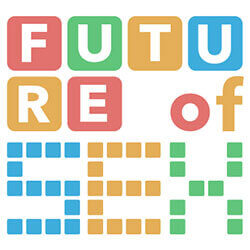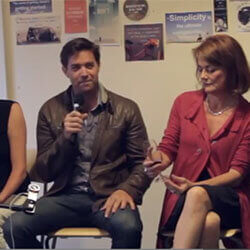Virtual Intimacy: The Digital Age Is Creating New Definitions for Sex
Forget what you thought you knew about sex and intimacy.
One of the most discussed topics at our Future of Sex meetup in Sydney last November was virtual intimacy. As technology expands the boundaries of sex, it also raises questions about what it means to connect with another person.
It’s almost impossible not to be affected in this digital world. Both adults and young people are exploring sexuality with new forms of communication. Sex tech is opening up huge possibilities for sex and intimacy, and with it discussion on whether that’s a good thing or not.
In the videos below, three panelists from the meetup, Mark Pesce, Jacqueline Hellyer, and Catharine Lumby, speak about the impact of these widening sexual avenues.
Negotiating Intimacy
Futurist Mark Pesce explores how the virtual realm is forcing us to rethink our ideas of intimacy, and paving the way for artificially intelligent sex partners.
“The idea that there’s this relationship between communication, and virtual reality is a form of communication, and eroticism is consistent across the entire recorded history. What we see now, sexting is a form of virtual, sexual communication—everything that we’re doing with Skype.
“But there are two things that are going on here. One is that virtual reality is also this space for projection. So things there are inherently less real. It’s more of a bardo realm, where more of what’s going on is actually going on in your head because sex is always going on in the head. But when there’s actually not another object present, it makes it all the easier to sort of hide in your head when that’s happening.
“At the same time, it also opens the door to an exploration of the types of polysexuality that are actually not even possible… You could conceivably have an erotic experience in a way with multiple entities, some of which could be AIs.”
Giving Up Old Ideas about Sex
Sex therapist Jacqueline Hellyer shares her excitement over how technology can help toss out retrograde views on sex and women’s sexuality.
[box type=”shadow”][quote] A lot of what I find, certainly with my clients, is how people build on intimacy. Because so much of what has been sex in the past has been a complete repression of female sexuality and a focus on men needing to basically come, like wank inside their partners. That was our model of sex.
That kind of approach to sex is still very much, “Well, that’s what sex is.” A lot of what I do in my work with people is to broaden the concept of what sex is, what intimacy is, what eroticism is, which may involve some physical coupling and shagging, but it doesn’t have to. You can have a quickie if you want, or you can have hours and hours of beautiful tantric lovemaking, or long-distance Fleshlight-enabling kind of stuff. I’m excited about that because technology’s already taking us away from this very, very limited view of sex that we used to have, opening it up to an understanding that hey, women are really sexual too.[/quote/][/box]
The Moral Panic over Teens and Sex
Professor Catharine Lumby of Macquarie University explains how teenagers are learning to manage online spaces, and that fears over pornography and hypersexuality are overblown.
“Of course, there are some hyper sexually active young teens. If it’s not safe and not consensual and not ethical, these are already extant issues in the family. They won’t be brought in by Facebook or sexting or anything else. But it’s also interesting. I think what’s new is the huge preponderance of online porn that we’ve talked about. I don’t see that it’s automatically toxic.
“What concerns me as a part of society is that there’s a lot of moral panic out there. We’re not doing a good job in schools. A lot of parents want to do a good job but don’t know how to talk about it, don’t know how to engage with their children on this. So one of the things, I do a lot of work on, is thinking about what are the techniques for that. I know that sounds very pragmatic and it’s far off the AI stuff and all of that, but in a way that is a form of virtual intimacy. The good news is that the teenagers I spoke to, seem to have a very good handle on the relationship, to what is real, what is online, and what Facebook’s good for and what it’s not.”
Leave a reply
You must be logged in to post a comment.

















